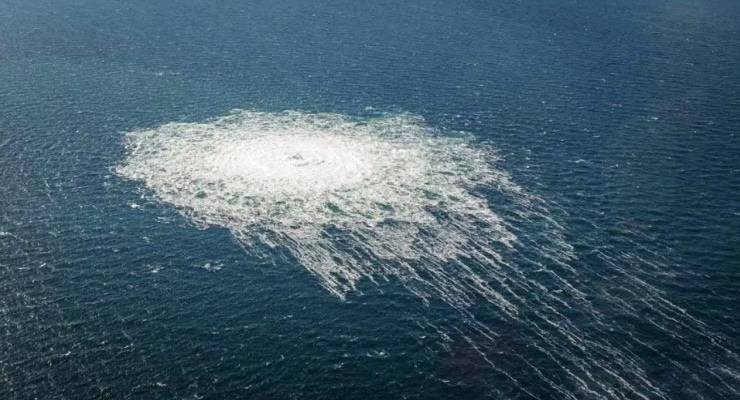
Explosions along the Nord Stream gas pipelines in the Baltic Sea in September have underscored the vulnerability of Europe’s critical energy and communications infrastructure in its northern seas, as tensions with Russia spiral over Moscow’s invasion of Ukraine.
Swedish and Danish investigators believe “several hundred kilograms” of explosives were used to blast vast holes in the undersea pipelines, which run from Russia to Germany under the Baltic Sea. While suspicion immediately fell on Moscow, which has sought to exploit its energy dominance over the continent — and particularly wants to starve Europe of energy this winter — ongoing investigations conducted by Sweden, Denmark and Germany have yet to pinpoint who was behind the attack. Moscow has denied any involvement.
The explosions had little immediate impact on European energy security. Moscow suspended gas transit through the original pipeline, Nord Stream 1, in July for 10 days, citing technical difficulties, while certification of Nord Stream 2 was suspended by Germany days before the Russian invasion.
But the fact that an apparent act of sabotage was able to take place in the busy Baltic Sea, which is surrounded by members of NATO as well as aspiring members Finland and Sweden, has underscored the difficulty of policing Europe’s vast northern waterways, which are home to critical energy facilities and communications networks.
“Seventy per cent of all energy in the world is either found at sea or moves by sea, and 93% of all data in the world moves by undersea cables,” said Bruce Jones, a senior fellow with the Brookings Institution. “We have very limited protections for either of those things.”
Norway — which is now the largest natural gas supplier to the European Union as Brussels seeks to wean itself off of its dependency on Russian energy — increased its military alert level on Tuesday after receiving a flurry of reports about unidentified drones flying near offshore energy facilities. Authorities also arrested seven Russians for controlling the drones and photographing sensitive areas, while the Norwegian embassy in Washington, DC, said that security and surveillance around energy and petroleum facilities have been stepped up.
‘Most severe security situation in decades’
“This is the most severe security situation in several decades,” Norwegian Prime Minister Jonas Gahr Støre said on Monday. “There are no indications that Russia is expanding its warfare to other countries, but the increased tensions make us more exposed to threats, intelligence operations and influence campaigns.”
NATO has also increased its air and naval presence in the Baltic and Northern seas in the wake of the attacks, while Germany, France and the UK have offered to assist Oslo with monitoring energy infrastructure in the North Sea.
In early October, European Commission President Ursula von der Leyen vowed to “stress test” energy and communications infrastructure for security vulnerabilities, noting that the explosions along the Nord Stream pipelines, whose parent company is majority-owned by the Russian state energy behemoth Gazprom, have “shown how vulnerable our energy infrastructure is”.
Naval experts were unsurprised that the pipelines could be subject to a deliberate attack in the Baltic Sea, though the waters had recently been dubbed a “NATO lake”. Even in a comparatively small area, experts said it is nearly impossible to maintain a constant picture of what’s going on above and below the surface. “Even a relatively small sea is awfully big,” Jones said.
NATO militaries and navies have warned that Europe’s seabed is its soft underbelly, said Julian Pawlak, a research associate at the University of the Federal Armed Forces in Hamburg, Germany.
Russia’s annexation of the Crimean Peninsula in Ukraine in 2014 was followed by a dramatic uptick in Russian submarine activity near undersea cables in the North Atlantic. At a 2020 meeting of NATO defence ministers, Russia’s activity was discussed amid growing concern that undersea cable networks in the region could be cut or tapped by Moscow.
A report requested by the European Parliament’s subcommittee on security and defence published in June found that while undersea cables provide the “backbone of the global economy”, accounting for the vast majority of global communications including $10 trillion in financial transactions daily, “European governance of cable protection and resilience still lags behind and needs improvement”.
While the Russian military has struggled to make headway in a conventional land war in Ukraine despite its relative size advantage, Moscow has long relied on a broad spectrum of intelligence activities including disinformation, political interference and assassination to disrupt and divide Europe.
A different world
“Major sabotage in the middle of the Baltic Sea, and all the other stuff going on, is a reminder that we are in a very different world compared to January,” said a European official, speaking on background on condition of anonymity.
As Russia’s ability to leverage its energy chokehold over Europe has waned as the continent scrambles to diversify its fuel supplies, experts said Moscow may increasingly turn to other asymmetric warfare tactics to exert pressure.
“Gazprom and Russia don’t have the leverage any more to inflict economic pain on the gas side,” said Henning Gloystein, an energy expert at the Eurasia Group. “They have to move onward if they want to continue inflicting pain and causing, sort of, insecurity in Europe.”
Moscow has the most sophisticated submarine program in the world after the US, Jones said, and the undersea fleet has been left largely unscathed by the war in Ukraine, which has bogged down the country’s army. “They have the relevant capabilities for tapping or snapping undersea data cables. Obviously, they have the capability for undersea sabotage of energy pipelines and the like,” he said.
While Russia has not proved shy about sabre-rattling in Europe’s northern seas, Gloystein noted that the explosions along the Nord Stream pipelines were on Russian-owned infrastructure. He questioned whether Moscow would risk the forceful response that could result from sabotaging the pipelines of a European or NATO member state. In January, the head of the UK’s armed forces, Admiral Tony Radakin, warned that any attempts to disrupt undersea cables would be viewed as an “act of war”.
Such an attack on European pipelines has “implications of triggering Article 5; it’s a direct attack on the EU, or maybe on a NATO member in the case of Norway”, said Gloystein. “We still see [that] as unlikely.”










History shows there’s another super power which is adept at blowing things up. It’s not Russia.
Perchance Radakin was prepping his special forces? Attacking the EU…hmmm…who could that be?
Ah, history. Such a quaint notion from far more innocent, naive, bygone times.
But neocons write their own history, haven’t you heard?
Alternative History, to be sure, much like Trump’s Alternative Facts.
With our Alternative History goggles [Googles?] firmly on, we can ponder such notions as “Russia’s ability to leverage its energy chokehold over Europe” without risk of synaptic snap.
I mean, we all know – or knew – that it’s the US imposed sanctions against Russian oil and gas that has created Europe’s energy crisis. Yes?
But facts and alternative history make ugly bedfellows.
Were we still to live in a world where facts and objective history still held sway, we would be forced to accept truths such as the sanctions are an act of war by the USA against not only Russia but also Germany and its fellow European vassal states.
More alarmingly, we would have to view the sabotage upon the Nordstream infrastructure as an even blatant, literal act of war perpetrated upon Germany and Russia.
Nuclear-armed Russia.
That’s a bit scary. Crazy scary.
If facts meant anything, we”d have to come to inconvenient conclusions such as: the bombing of the pipelines was an act of war; Had it been perpetrated by anyone not acting upon the explicit instructions of The Hegemon [ie the cartel running the USA] , it would have immediately been declared an act of war; that it hasn’t and the fact the perpetrator has not been named proves beyond all doubt who ordered and directed the attack. Case closed.
Thankfully, we don’t have to worry about just how close we’re coming to thermonuclear oblivion.
That’s why Alternative History and Alternative Facts are such terrific innovations.
Why would Russia blow up their own pipeline? They only need to turn off the tap. So who did it and why? I think the net needs to be cast elsewhere.
I think the theory is that it is terrifying for europe, a warning and a distraction. To Russia, it makes little difference, because as you say, it’s not in use so not earning them any money and now has no prospects. Incredible really after all that work. Having worked on a few destroyed IT projects, I feel for the engineers and workers, it was an amazing feat of engineering.
If nothing else, the Russians have shown that like any Terrorist state, they are really into destroying vulnerable civilian infrastructure and creating chaos.
Admittedly, the US does have a poor historical record!
Germany refused to open the completed & pressurised N/S2 on Feb22, before Russia moved across the Ukraine border.
N/S1 was fully functional until 02.03hrs (local) 26th September when N/S2 was blown SE of the Danish island Bornholm.
Exactly 17 hours later, north of Bornholm, there were 2 more explosions near the juncture of both pipelines, which are about 30kms apart, where they separate to deliver to different markets.
Did someone mention proxy?
This seems to imply the damage was done from outside the pipeline. Was it? Anyone with access to the onshore part of the pipeline could sabotage it much more easily, reliably and effectively by sending explosives inside the pipeline carried by an inspection or cleaning pig. (These devices are routinely sent along such pipelines.) It could hardly be easier for Russia to do that, and there is no conceivable way for other countries to protect against it.
One wonders what impact this would have on Australia’s policy development regarding pipelines, shipping energy in/out and data cables, i.e. defence, security and data (on latter we even struggle to protect data from human hacking threats….)?
Would suggest that our own shipping lanes and/or data cables need to be defended and back up with alternatives close to home, but also any negative impacts can be lessened by transition away from fossil fuels sources to local renewable energy sources, ‘on the ground’.
Ooops almost choked on my corn flakes. It must have been the Russians because if it was somebody else it was an act of International Terrorism. One would not want to be guilty of that because it may be a reason to respond with an invasion like the USA and Australia et al did with Iraq. Can’t break those International Rules Based Laws developed by the dominant white nations making up about 10% of the World population.